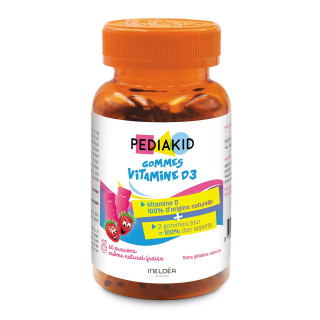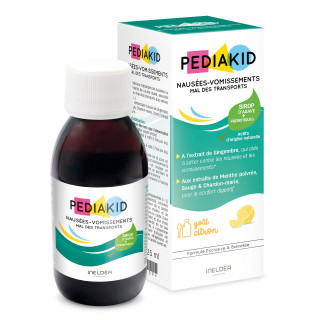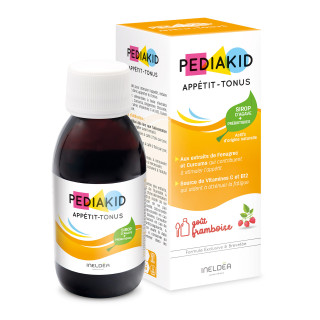- Promo

Rich in naturally sourced vitamin d3 (100% dv) growth and resistance practical and ludic formula with a tasty flavour
Alimentary product to be used for medical purposes: For new-borns and toddlers that lack nutrients when affected by gastro enteritis or diarrhea induced by antibiotic intake.
Diarrhea is a digestive disorder. Symptoms are frequent discharge of liquid or soft faeces. This phenomenon is commonly experienced by new-borns and toddlers. However, it still needs to be monitored as it is usually caused by a virus (such as the rotavirus common in winter), dental growth, bacteria, or antibiotic intake. The primary concern should be to monitor baby’s hydration.
PEDIAKID® Diaréa® can complement a hydration product. It contains 2 types of lactic ferment (Lactobacillus rhamnosus Rosell®-11 et Bifidobacterium animalis subsp lactis Lafti®B94), carefully selected to suit new-borns and toddlers’ nutrition needs in case of a severe gastro enteritis or diarrhea induced by an antibiotic treatment. One bag contains 10 billion probiotics combined with acacia prebiotic fibres which develop good intestinal bacteria growth. Intestinal microbiota is restored and good bacteria replace the ones causing issues, diminishing faeces frequency.
Gluten free – Lactose free Allergen free. Neutral flavour.
7 packets – neutral flavour.
Weight: 10.50g
• A complex organ = 100 000 billion bacterias
• Builds and develops itself during the first three years of life
• Once functional balance is reached, it would be influenced by nutritional intakes and its environment
• Efficient microbiota, rich from more than 500 species
Intestinal microbiota plays a key role in the digestive process as it favours the fermenting process. It ensures the proper intake of nutrients such as vitamins, minerals from our food intake.
Intestinal microbiota intervenes as well in the immune system and natural defences support by protecting the digestive tube from pathogenic microorganisms’ expansion (shield effect).
To add, it makes possible the development and maturation of the immune system throughout the life of the individual. The intestine host not less than 70% of immune cells.
Intestinal microbiota takes part in the sugar, fat processing and appetite regulation. It participates as well in the vitamin production such as vitamin B or K.
Finally, it also make the synthesis between neurotransmitters and is involved in the brain-intestine communication.
Intestinal microbiota can impoverish and loose diversity due to:
>Age
>High sugar, fat intake from the daily diet or too strong consumption of industrialized goods
>Stress
>Antibiotic intake
>Functional disorder
… leading to intestinal issues (diarrea, constipation, bloating), weight gain, drop in immune defences (sensitive to infections) and vitality. On the long term, it can become a risk factor for metabolic diseases.
Several elements are capable to restore microbiota’s properties:
Probiotics: Living microorganisms, bacteria or yeasts, which are administered in sufficient quantities with the right strain, favour the intestinal microflora development and balance. In addition to positive nutritional effects (WHO-FAO, 2001), they have a positive impact on the overall individual health.
>Establish a normal transit: fight against constipation, diminishes the frequency and duration of diarrhea linked to antibiotic intakes or infections (gastro-enteritis, food poisoning).
>Reduces bloating, abdominal pain, transit disorder
>Ease digestion, more specifically of individuals suffering of lactose intolerance.
>Enhance the intestinal mucous barrier function: balances the beneficial microorganism population, stimulates mucous and antibacterial secretion produced by enterocytes, increase type IgA antibody production involved in the immune response.
>Regulate the intestinal immune system activity: Reinforcement in case it weakens, diminishes the overactivation in case of allergies or intestinal functional disorder.
>Enhance hepatic function
>Improve energetic discharge and diminishes lipidic absorption
Directions: From birth. 1 packet a day. Empty in the baby bottle and add milk or stir with a low amount of water, or blend with adapted food (<37°C). Take preferably before or while eating. Can be used to complement a hydration product for 7 days.
Warnings: Use PEDIAKID Diarea under doctor surpervision. Pediakid Diarea cannot be the only nutrition source. This product was formulated to suit new-borns and toddlers’ specific nutrition needs (until 5 years old included), suffering from severe diarrhea causes by severe gastro enteritis or antibiotic intakes. To be stored in a cool and dry environment. No parenteral administration. Best before the expiring date.
Ingredients: Maltodextrin, lactic ferments: Bifidobacterium animalis subsp lactis Lafti®B94, Lactobacillus rhamnosus Rosell®-11 ; Fibregum™ acacia prebiotic fibres.
Fibregum™ is a Nexira brand.
Nutrition facts:
| 1 Packet | |
|---|---|
| Lactic ferments | 10 milliards UFC* |
| Including Bifidobacterium animalis subsp lactis Lafti®B94 | 5 milliards UFC* |
| Including Lactobacillus rhamnosus Rosell®-11 | 5 milliards UFC* |
| Energy | 20 kJ (5 kcal) |
| Fat | 0 g |
| Including saturated fat | 0 g |
| Carbohydrates | 1 g |
| Including sugar | < 0.5 g |
| Alimentary fibres | 0.45 g |
| Proteines | < 0.5 g |
| Salt | < 0.01 g |
| 100 g | |
|---|---|
| Energy | 1340 kJ (320 kcal) |
| Fat | < 0.5 g |
| Including saturated fat | 0 g |
| Carbohydrates | 61 g |
| Including sugar | 3.3 g |
| Alimentary fibres | 30.0 g |
| Proteines | 4.8 g |
| Salt | 0.6 g |
*CFU: Colony Forming Unit
Top et livraison rapide
Produits efficace pour des diarrhée passagère, ma fille n'a aucun mal a le boire
Pas encore test
J ai acheté ce produit en prevision je ne l ai pas encore utilisé
Foarte eficient. Sunt mulțumită!
Traitement qui tombait à pic. Efficace.
Très bon produit!

Ginger extract calm nausea and vomiting peppermint extract, sage and milk thistle extract: improve digestive comfort

Rich in curcuma and fenugreek extracts favouring better appetite rich in vitamin c and b-12 boosting the energy
check_circle
check_circle


